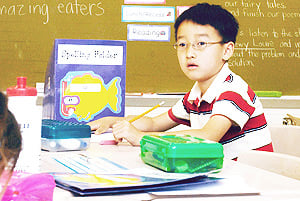Parents → Prekindergarten to High School → Elementary School
Welcome to Elementary School: Grades K–5
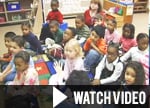 During the summer, you will receive a mailing from your child's school with important information, such as bus routes, school procedures, and school supplies, that you need to know before school begins in the fall. Most schools hold an open house the week before school starts when parents and students come to school to meet the teachers and visit the classrooms. You also may be able to purchase student planners or assignment books for your child, deposit money into your child's meals account, sign up to participate in the PTA, and take care of other details related to the starting of school.
During the summer, you will receive a mailing from your child's school with important information, such as bus routes, school procedures, and school supplies, that you need to know before school begins in the fall. Most schools hold an open house the week before school starts when parents and students come to school to meet the teachers and visit the classrooms. You also may be able to purchase student planners or assignment books for your child, deposit money into your child's meals account, sign up to participate in the PTA, and take care of other details related to the starting of school.
Kindergarten Orientation
The introduction to elementary school starts long before the first day of school. Kindergarten orientation is held in the spring prior to your child starting school. At this orientation, you can register your child, visit the classroom, meet the teachers, and learn about the school and the instructional program. Your child also will have the opportunity to meet some classmates and participate in learning activities. Contact your local school to find out when kindergarten orientation is scheduled and to make an appointment.
Additional Information
The Typical Elementary School Day
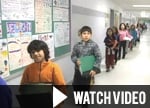 Elementary schools either start at 8:50 a.m. and end at 3:05 p.m. or start at 9:15 a.m. and end at 3:30 p.m. Your school's schedule is included in the information that is sent home during the summer. It is important that your child be at school on time every day. Make sure your child is well-rested, is dressed appropriately for indoor and outdoor activities, and has completed homework assignments.
Elementary schools either start at 8:50 a.m. and end at 3:05 p.m. or start at 9:15 a.m. and end at 3:30 p.m. Your school's schedule is included in the information that is sent home during the summer. It is important that your child be at school on time every day. Make sure your child is well-rested, is dressed appropriately for indoor and outdoor activities, and has completed homework assignments.
Breakfast is offered in either the classroom or the all-purpose room, depending on the school. Most students eat lunch in the all-purpose room, and lunch times vary from grade to grade. If your child forgets his/her lunch, you can bring it to the school office. If you are not able to do this, a lunch will be provided for your child.
Your child may have different teachers for math, reading, social studies, and science. Most students change classrooms for art, music, and physical education and are taught these subjects by teachers who specialize in these areas.
All elementary students have a 20-30 minute recess where students can play and socialize. Weather permitting, recess is held outdoors.
At the end of the day, students are dismissed through an orderly process. Check with your school for information about specific dismissal procedures for bus riders, walkers, and students picked up by their parents.
Students will be assigned homework in the elementary grades. Teachers assign homework three to five nights per week to help students practice skills, enrich learning, and develop study, organizational, and time management skills.
Instructional Program
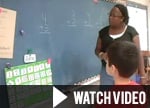 All students in elementary school receive instruction in four core subject areas: reading/language arts, mathematics, science, and social studies. Students receive instruction in reading and math every day. Students also have classes in physical education, art, and music. Classroom instruction is differentiated, which means that teachers vary the pace of instruction or adjust the difficulty of the material based on students’ level of performance. For example, for students who are ready for more advanced work, teachers can give them the opportunity to study a subject in greater depth or present material from the next grade level.
All students in elementary school receive instruction in four core subject areas: reading/language arts, mathematics, science, and social studies. Students receive instruction in reading and math every day. Students also have classes in physical education, art, and music. Classroom instruction is differentiated, which means that teachers vary the pace of instruction or adjust the difficulty of the material based on students’ level of performance. For example, for students who are ready for more advanced work, teachers can give them the opportunity to study a subject in greater depth or present material from the next grade level.
Schools provide students who need extra reading and math support with help during the school day and/or in before- and after-school programs. For information on the specific programs available at your school, contact your child’s teacher.
Instrumental music classes, offered in Grades 4 and 5, allow students to learn to play instruments. Check with your child’s school to find out where instruments can be rented and about arrangements for parents who need financial assistance.
Parent Guides to the Curriculum
Parent Guides to the Curriculum explain what your child will be learning in reading, language arts, mathematics, science, social studies, music, art and physical education in grades K through 5. The guides are available at your school and online.
Additional Information
Extracurricular Activities, Sports, and Special Events
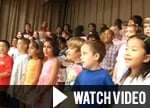 Elementary schools offer a variety of activities before and after school, such as homework club, chess club, foreign language classes, and other activities based on student interests and availability. Schools also may partner with outside organizations to provide other opportunities. Check with your school to find out about afterschool opportunities for your child.
Elementary schools offer a variety of activities before and after school, such as homework club, chess club, foreign language classes, and other activities based on student interests and availability. Schools also may partner with outside organizations to provide other opportunities. Check with your school to find out about afterschool opportunities for your child.
Student performances are an important part of elementary school. Your child may participate in the school chorus, an instrumental music group, or other groups that will perform for students, parents, and school staff. Other special events that take place in elementary school may include field day, talent show, art showcase, international night, and many other activities that showcase and recognize students' talents and work.
All elementary schools have "picture day." Class and individual photos are taken of students by a professional photographer. Parents have the option to purchase photos if desired.
Do schools provide before- and after-school child care?
Schools do not provide child care; however, some elementary schools house before- and after-school child care programs operated by private organizations. For information about on-site child care, check with your school.
Additional Information
- Locate Child Care, 301-279-1773
- The Montgomery County Child Care Resource Network, 240-777-3110
- The Child Care Information Resource Book, available in county public libraries
Get Ready for Middle School
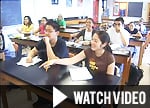 When your child is in 5th grade, you will begin to receive information about middle school. Look for information in your child's backpack and visit your middle school's website for announcements about upcoming events and opportunities for incoming students and their parents.
When your child is in 5th grade, you will begin to receive information about middle school. Look for information in your child's backpack and visit your middle school's website for announcements about upcoming events and opportunities for incoming students and their parents.
In January or February, parents of 5th grade students are invited to attend a meeting at their child's middle school. At this meeting, school administrators provide information about middle school, introduce key staff, give parents advice on how to help their students prepare for the changes ahead, and provide tours of the school. This meeting is advertised through flyers, school websites, and school and PTA newsletters.
Also in the winter of Grade 5, middle school counselors visit elementary schools to talk with 5th grade students. Students receive the school's course booklet that describes the required and elective courses offered. School staff from both the elementary and middle schools develop student schedules based on input from both students and parents.
Informational packets and applications for the middle school magnet programs are sent to elementary schools in October. Applications for these special programs are due in November. For more information about these and other special academic programs, contact your child's school counselor, the school where the program is offered, or online.
The MCPS Guide to the Middle School Program, also referred to as the middle school course bulletin, is available to help students and parents get ready for middle school. This booklet is available at your child's school and on the MCPS website.
Additional Information
